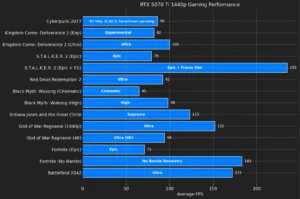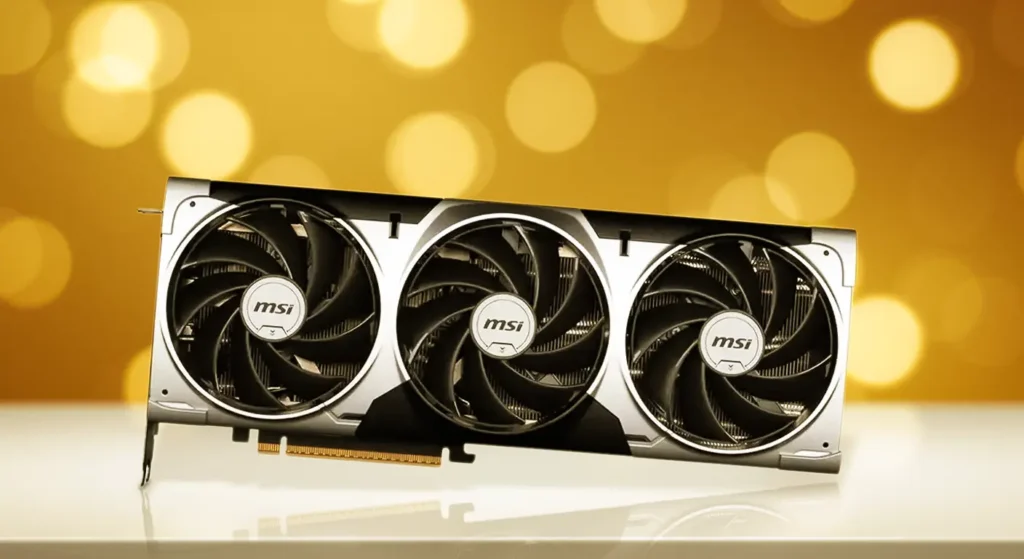PC gamers are always chasing that perfect balance: incredible visuals and buttery-smooth gameplay. The RTX 5070 Ti 16GB MSI Ventus 3X is the latest contender vying for your attention, promising to deliver just that. But in a world of flashy marketing and endless spec sheets, how do you know what’s real? This review isn’t about hype. We’re cutting through the noise to give you an honest, no-nonsense look at what this graphics card truly offers.
We’ve put the RTX 5070 Ti MSI Ventus 3X through its paces, testing it where it matters most: in the heat of modern games. We’ll be examining how it performs at the visually demanding 1440p resolution, diving into frame rates in the latest AAA blockbusters and competitive esports titles. Beyond raw speed, we’ll explore the impact of NVIDIA’s newest technologies, like DLSS 4 and ray tracing, to see if they live up to the hype or are just marketing buzzwords.
But it’s not all about the good stuff. We’ll also shine a light on potential downsides. Is the cooling effective, or will noise become an issue? How much power does this card actually draw? And crucially, is the RTX 5070 Ti really worth your money in today’s crowded graphics card market? Join us as we unpack the RTX 5070 Ti MSI Ventus 3X, providing you with the clear, unbiased information you need to make your own informed decision. This is about real-world performance, honest assessment, and helping you understand if this GPU is the right choice for your gaming setup.
Specifications & Features: Blackwell Architecture and GDDR7
The RTX 50 series, built on the new Blackwell architecture, signifies a notable evolution beyond the RTX 40 generation. The RTX 5070 Ti showcases several key advancements:
| GPU | Release Price | Cores | ROPs | Core Clock | Boost Clock | Memory Clock | GPU | Memory |
|---|---|---|---|---|---|---|---|---|
| RTX 4070 Ti | $700 | 7680 | 80 | 2310 MHz | 2610 MHz | 1313 MHz | AD104 | 12 GB, GDDR6X, 192-bit |
| RTX 4070 Ti Super | $750 | 8448 | 112 | 2340 MHz | 2610 MHz | 1313 MHz | AD103 | 16 GB, GDDR6X, 256-bit |
| RX 7900 XT | $620 | 5376 | 192 | 2000 MHz | 2400 MHz | 2500 MHz | Navi 31 | 20 GB, GDDR6, 320-bit |
| RTX 5070 Ti | $750 | 8960 | 96 | 2295 MHz | 2452 MHz | 1750 MHz | GB203 | 16 GB, GDDR7, 256-bit |
| MSI RTX 5070 Ti Ventus 3x | $750 | 8960 | 96 | 2295 MHz | 2482 MHz | 1750 MHz | GB203 | 16 GB, GDDR7, 256-bit |
| RTX 5080 | $1000 | 10752 | 112 | 2295 MHz | 2617 MHz | 1875 MHz | GB203 | 16 GB, GDDR7, 256-bit |
A standout feature of the RTX 50 series is the introduction of DLSS 4, powered by Transformer Neural Networks. This new upscaling technology represents a significant leap over the previous CNN-based DLSS iterations. Independent assessments highlight the transformative improvement in image quality. “Quality” mode in DLSS 4 is described as virtually indistinguishable from native resolution, sometimes even surpassing it in clarity, particularly in rendering fine details and eliminating visual artifacts like flickering and texture smearing. This enhanced image fidelity applies not just to the RTX 50 series, but is enabled for all RTX cards via driver updates leveraging Tensor Cores. While a performance cost of approximately 10% is observed compared to older DLSS CNN models, the general consensus is that the visual fidelity gains of Transformer Upscaling are well worth the trade-off. NVIDIA’s driver support now allows per-game DLSS overrides in the NVIDIA App, enabling users to experience these benefits across a broader range of titles.
Compared to its predecessors, the RTX 4070 Ti and RTX 4080, the RTX 5070 Ti aims to deliver performance between these two cards, often approaching or even exceeding the RTX 4080, especially at higher resolutions. The move to GDDR7 memory and the Blackwell architecture are key factors contributing to these performance gains.
3. Build Quality & Design: MSI Ventus 3X – Functional and Effective, if a bit Loud

The MSI Ventus 3X embodies a practical, cost-conscious design philosophy, aligning with NVIDIA’s MSRP target. While constructed with a plastic shroud, the Ventus design is considered aesthetically pleasing by many, drawing comparisons to the RTX 2080 Ti Founders Edition in its understated appeal. The neutral color scheme ensures compatibility with diverse build themes. Features like RGB lighting and dual BIOS are omitted, keeping the focus on core functionality and value.
Cooling Performance & Noise: The Ventus 3X cooler demonstrates impressive thermal management capabilities. Temperatures consistently remain low, peaking at 65-68°C under heavy gaming loads and stress tests. However, this thermal performance comes at the cost of noise. Measuring around 41 dBA under load, the card is considered noticeably loud, especially relative to its performance segment. It’s been observed that MSI appears to have prioritized extremely low temperatures, possibly sacrificing optimal noise levels in the process. It’s suggested that allowing slightly higher temperatures (e.g., 75°C) could have resulted in a significantly quieter operation without compromising thermal safety. Assessments also point out the noticeable fan noise, suggesting it could be a drawback for noise-sensitive users.
Size & Compatibility: The dual-slot design ensures excellent compatibility with most ATX PC cases. This standard form factor simplifies integration for a wide range of system builds.
4. Gaming Performance Tests (1440p): Dominating the 1440p Arena
Benchmark results at 1440p confirm the RTX 5070 Ti’s prowess in modern gaming. Performance consistently aligns with or slightly trails the RTX 4080 at 1440p, with instances of surpassing the RTX 4080, particularly at 4K.

AAA Titles 1440p test result
-
Cyberpunk 2077: Phantom Liberty: At 1440p with Ray Tracing Ultra, DLSS Quality, and Transformer model, the RTX 5070 Ti averages 86 FPS. This demonstrates strong performance even in one of the most graphically demanding games with heavy ray tracing enabled.
-
Kingdom Come: Deliverance 2: In this CPU-intensive title, the RTX 5070 Ti maintains excellent performance. At 1440p “Experimental” settings, it achieves 82 FPS average, exceeding 100 FPS at “Ultra” settings, showcasing its ability to handle both GPU and CPU-bound workloads effectively.
-
S.T.A.L.K.E.R. 2: At 1440p Epic settings, S.T.A.L.K.E.R. 2 runs at 79 FPS average. Frame Generation provides a substantial boost to 235 FPS, illustrating the significant performance uplift Frame Generation can offer in supported titles – a nearly 200% increase.
-
Red Dead Redemption 2: Running at 1440p Ultra, Red Dead Redemption 2 averages 92 FPS, with peaks above 110 FPS in less demanding scenes. The RTX 5070 Ti handles this visually rich open-world title with ease.
-
Black Myth: Wukong: At 1440p “Cinematic” (maxed) settings, the RTX 5070 Ti achieves a playable 65 FPS average. “High” settings push performance to 98 FPS. Frame Generation can further increase frame rates to over 160 FPS, albeit with minor visual compromises.
-
Indiana Jones and the Great Circle: At 1440p “Supreme,” the RTX 5070 Ti delivers a smooth 123 FPS average, ensuring responsive gameplay.
-
God of War Ragnarok: This title performs exceptionally well, achieving 152 FPS average at 1440p Ultra and a very playable 94 FPS at 4K resolution, demonstrating its versatility across resolutions.
Competitive/Esports Titles:
-
Fortnite: At 1440p Epic settings, Fortnite runs at 71 FPS. Disabling Nanite Virtualized Geometry dramatically increases performance to 183 FPS, providing ample headroom for competitive frame rates.
-
Battlefield 2042: In large-scale 1440p Ultra multiplayer matches, Battlefield 2042 averages 172 FPS, ensuring smooth, low-latency gameplay essential for competitive online gaming.
5. Thermals & Power Draw: Performance Demands Power
The Ventus 3X cooler effectively manages heat, maintaining GPU temperatures between 62-65°C during gaming. Power consumption averages around 270W during gaming, with idle consumption between 18-20W.
While delivering a performance uplift, the RTX 5070 Ti exhibits a slight increase in power consumption compared to its predecessor, the RTX 4070 Ti, which typically draws 245-250W. This suggests a modest decrease in power efficiency compared to the previous generation.
6. Productivity & Content Creation: Beyond Gaming Prowess
The RTX 5070 Ti extends its capabilities beyond gaming, proving to be a competent performer in content creation and professional applications.
-
Blender & DaVinci Resolve: In Blender 4.3.0, the RTX 5070 Ti demonstrates a 13.91% performance advantage over the RTX 4070 Ti in rendering tasks. DaVinci Resolve shows a more modest 7.45% performance increase.
-
AI Workloads: Using the Proceyon GenAI benchmark with Stable Diffusion 1.5 (FP16), the RTX 5070 Ti outperforms the RTX 4070 Ti by a significant 26.28% in AI-accelerated tasks, indicating strong potential for AI-related workflows.
7. Conclusion
(Is It Worth It? A 1440p Powerhouse, but Noise Considerations Exist)
The RTX 5070 Ti 16GB MSI Ventus 3X emerges as a highly capable graphics card, particularly for gamers targeting high-refresh-rate 1440p and even 4K gaming. Its raw performance is undeniably impressive, delivering smooth frame rates across a wide range of demanding titles, while benefiting from the visual enhancements of DLSS 4 and robust ray tracing capabilities. The MSI Ventus 3X cooler effectively manages thermals, albeit with a noticeable increase in noise levels.
Who should buy this GPU?👍
-
-
Significant Performance Uplift: The RTX 5070 Ti demonstrates substantial performance gains, exhibiting an approximate 30% increase in performance compared to its predecessor, the RTX 4070 Ti. This represents a noteworthy generational improvement, providing a tangible upgrade for users seeking enhanced gaming experiences.
-
Competitive Rasterization and Ray Tracing Performance: In rasterized workloads, the RTX 5070 Ti achieves performance parity with the AMD Radeon RX 7900 XTX, a top-tier competitor in its class. Furthermore, the RTX 5070 Ti establishes a clear performance advantage in ray tracing scenarios, solidifying its position as a leading option for gamers prioritizing visually advanced graphical features.
-
Cutting-Edge DLSS 4 Technology: The inclusion of DLSS 4, featuring Frame Generation and Transformer Upscaling, represents a significant advancement in image upscaling and performance enhancement. This technology not only delivers smoother gameplay through frame interpolation but also offers superior image quality via Transformer Upscaling, improving visual fidelity even at upscaled resolutions.
-
Factory Overclocked with Overclocking Headroom: The MSI Ventus 3X RTX 5070 Ti arrives pre-overclocked from the factory, providing enhanced performance out-of-the-box. Additionally, the card exhibits impressive overclocking potential, allowing enthusiasts to further push performance boundaries through manual adjustments, unlocking even higher frame rates and benchmark scores.
-
Effective Idle Cooling and Silent Operation: The implementation of an idle fan-stop feature ensures silent operation during low-load tasks such as desktop work or web browsing. This contributes to a quieter computing environment when demanding graphical processing is not required.
-
Modern Connectivity and Future-Proofing: The RTX 5070 Ti incorporates contemporary display and interface standards, including HDMI 2.1 and DisplayPort 2.1 for high-bandwidth display connectivity, and PCI-Express 5.0 for optimal data transfer rates with compatible motherboards. These features contribute to the card’s longevity and compatibility with current and future hardware ecosystems.
-
Robust Video Encode/Decode Hardware Acceleration: The RTX 5070 Ti provides excellent hardware acceleration for video encoding and decoding, making it well-suited for content creators, streamers, and users who frequently engage in video-related tasks. This hardware support offloads processing from the CPU, improving efficiency and speed in relevant applications.
Considerations before purchasing: 👎
-
Elevated Noise Levels Under Load: While effectively maintaining low temperatures, the MSI Ventus 3X cooler operates at a relatively high noise level under demanding gaming workloads. The focus on aggressive thermal management results in fan noise that may be noticeable and potentially distracting, particularly for users prioritizing quiet operation.
-
Suboptimal Power Consumption in Non-Gaming Scenarios: While exhibiting reasonable power consumption during gaming, the RTX 5070 Ti demonstrates higher than ideal power draw in idle, multi-monitor, and video playback scenarios. This may impact overall system energy efficiency for users who frequently operate outside of heavy gaming loads.
-
Limited Overclocking Customization: Certain restrictions are imposed on user overclocking. Specifically, the power limit cannot be increased beyond the factory setting, and memory overclocking is artificially limited by driver-level constraints. These limitations restrict the extent of manual performance tuning available to advanced users seeking maximum overclocking potential.
-
If priced competitively and noise is a manageable factor, the RTX 5070 Ti 16GB MSI Ventus 3X is a strong contender in the high-performance GPU market, delivering a potent combination of gaming performance, cutting-edge features, and impressive thermal management, albeit with a somewhat louder fan profile.


